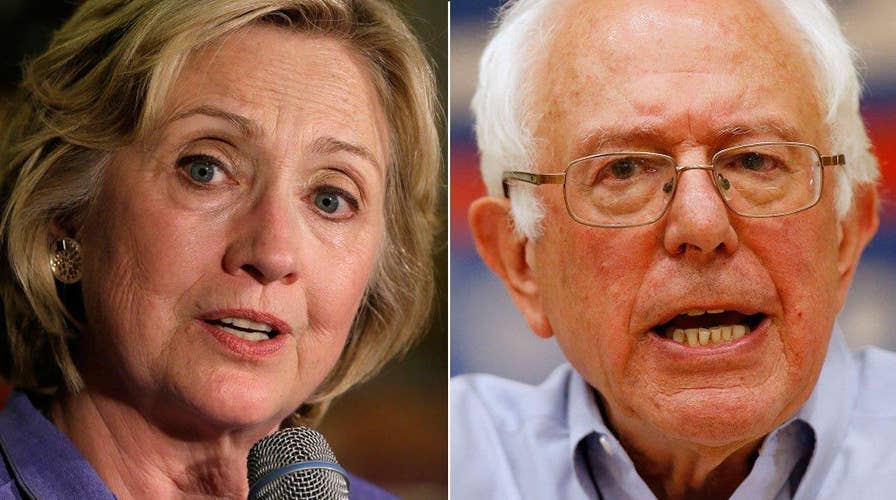Will contentious primary fight damage the Democratic Party?
Reaction from Amy Chozick, political reporter for The New York Times
The Democratic presidential race is getting uglier — pulling other party leaders into the fray — as Sen. Bernie Sanders lashed out at front-running rival Hillary Clinton as "not qualified" to be president because of "special-interest" contributions to her super PAC.
"She has been saying lately that she thinks that I am quote-unquote not qualified to be president," Sanders told a crowd of more than 10,000 people Wednesday at Temple University's Liacouras Center in Philadelphia. "I don't believe that she is qualified if she is, through her super PAC, taking tens of millions of dollars in special-interest funds."
"I don't think you are qualified if you get $15 million from Wall Street through your super PAC," Sanders continued to cheers from his audience. "I don't think you are qualified if you have voted for the disastrous war in Iraq. I don't think you are qualified if you have supported virtually every disastrous trade agreement which has cost us millions of decent-paying jobs."
Sen. Barbara Boxer, D-Calif., a key Clinton ally, responded to Sanders with an emphatic message on Twitter.
Clinton spokesman Brian Fallon added his own tweet: "Hillary Clinton did not say Bernie Sanders was `not qualified.' But he has now -- absurdly -- said it about her. This is a new low."
Indeed, Clinton did not say Sanders was "unqualified" or "not qualified" during a much-quoted interview Wednesday morning on MSNBC's "Morning Joe."
In a discussion of an interview with Sanders that appeared in the New York Daily News, Clinton was asked if "Bernie Sanders is qualified and ready to be president of the United States."
She responded, "Well, I think he hadn't done his homework and he'd been talking for more than a year about doing things that he obviously hadn't really studied or understood, and that does raise a lot of questions."
Sanders spokesman Michael Briggs said Wednesday evening that Sanders was responding to reports on the CNN and Washington Post websites. A Post story was headlined, "Clinton questions whether Sanders is qualified to be president."
The Democratic race has become noticeably fractious in recent weeks as Sanders has closed the delegate gap with a series of wins over Clinton, capped by Tuesday's convincing victory in the Wisconsin Democratic primary. His campaign manager fueled the fire by predicting that the Democratic convention in Philadelphia could become an open contest for the nomination.
“It will be an open convention, likely with neither candidate having a majority of pledged delegates," Sanders campaign manager Jeff Weaver told CNN on Tuesday.
In response, Clinton campaign manager Robby Mook blasted out a fundraising memo as Sanders was rolling to victory in Wisconsin, saying Clinton’s delegate lead “is nearly insurmountable.”
He said the Sanders camp, in pushing for an open convention, is trying to “flip delegates’ votes, overturning the will of the voters.”
The complicating factor is the role played by “superdelegates,” party insiders free to support whomever they want. When those delegates and “pledged” delegates awarded via primaries and caucuses are added together, Clinton has a huge 1,748-1,058 delegate lead.
She would need to win just 635 of the remaining delegates – roughly a third -- to get a majority of total delegates, or 2,383, before the convention. Given her record in the primaries so far, that’s hardly a heavy lift.
But when only pledged delegates are counted, Clinton’s lead is narrower, at 1,279-1,027.
Despite Weaver’s comment, Clinton could easily win a majority of them with roughly 43 percent of the remaining pledged delegates.
The Sanders campaign, however, may be setting the bar much higher. If they argue Clinton must win 2,383 pledged delegates to clinch the nomination – in other words, hit a majority of all delegates counting only pledged delegates – she would need more than 60 percent of the remaining pledged field.
Asked specifically what it would take to avoid an open convention, a DNC official reiterated that 2,383 represents the majority of all delegates, but would not speculate beyond that.
Fox News' Ed Henry, FoxNews.com's Judson Berger and the Associated Press contributed to this report.













































